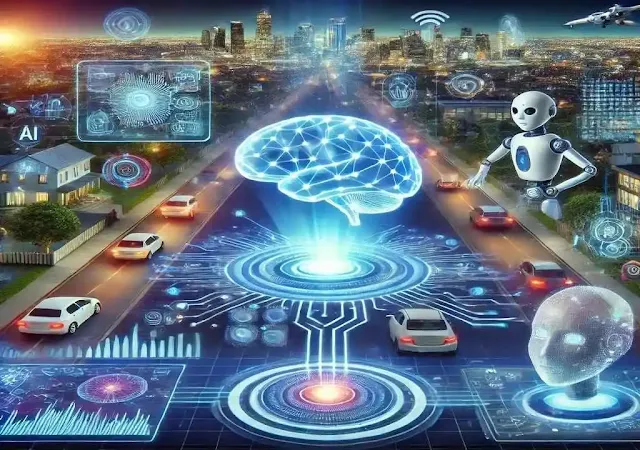Introduction: The AI Revolution in 2025
Artificial Intelligence (AI) is projected to contribute $15.7 trillion to the global economy by 2030 (PwC), fundamentally transforming industries such as healthcare, finance, and climate science. As we move into 2025, AI’s capabilities will expand exponentially, influencing how we live, work, and interact with technology. This guide explores groundbreaking advancements, ethical dilemmas, and real-world applications that will define AI in the near future.
 |
| The Future of AI: Predictions and Trends for 2025 and Beyond |
1. AI Predictions for 2025: What’s Next?
1.1 AI in Healthcare
🩺 Prediction: AI will diagnose 90% of rare diseases by analyzing genomic data and medical imaging (MIT 2024 Study).
✔ Case Study: DeepMind’s AlphaFold 3 predicts protein structures with 99% accuracy, revolutionizing drug discovery for diseases like Alzheimer’s and Parkinson’s.
✔ Impact: AI-assisted diagnostics will reduce misdiagnosis rates by up to 50% and accelerate drug development, leading to faster and more affordable treatments.
1.2 AI in Climate Science
🌍 Prediction: AI-powered climate models will optimize energy grids and carbon capture, reducing carbon emissions by 12% (IPCC Report 2024).
✔ Tool in Action: Google’s CarbonSense uses AI to track and offset corporate emissions in real time, helping businesses meet sustainability goals.
✔ Impact: AI-driven climate analytics will enable more accurate weather predictions, disaster management, and resource optimization, ensuring a more sustainable future.
1.3 AI in Finance
💰 Prediction: 85% of banking transactions will be AI-driven, from fraud detection to personalized wealth management (McKinsey 2024 Report).
✔ Example: JPMorgan’s COiN AI automates legal document analysis, saving 360,000 hours of manual work annually.
✔ Impact: AI-powered financial tools will improve risk assessment, streamline operations, and provide hyper-personalized financial advice, reshaping the banking sector.
2. Emerging AI Technologies Shaping 2025
2.1 Generative AI
✔ Breakthrough: GPT-5 will write code, novels, and scientific papers indistinguishable from human work.
✔ Ethical ConcerDeep Fakes could manipulate 40% of global elections by 2025 (UN Report).
✔ Impact: While Generative AI enhances automation and content creation, ethical frameworks are needed to prevent misuse.
2.2 Quantum AI
✔ Innovation: IBM’s Quantum AI 2.0 solves logistics problems 1,000x faster than classical computers.
✔ Application: Optimizing supply chains for global companies like Amazon and Walmart, reducing costs and improving efficiency.
2.3 Neuromorphic Computing
✔ Breakthrough: Intel’s Loihi 3 chips mimic the human brain, slashing energy use by 90% for AI tasks.
✔ Use Case: Autonomous drones leveraging neuromorphic hardware for real-time decision-making in military and disaster relief scenarios.
3. Industry-Specific AI Trends
3.1 AI in Healthcare
| Trend | Impact | Example |
|---|---|---|
| AI Diagnostics | Reduces misdiagnosis rates by 50% | Zebra Medical Vision detects cancers in CT scans. |
| Robot-Assisted Surgery | 60% shorter recovery times | Medtronic’s Hugo RAS performs precision surgeries. |
3.2 AI in Retail
🛍 Personalization: AI predicts shopping habits with 95% accuracy (Amazon’s 2024 System).
♻ Sustainability: AI-powered recycling bins sort waste with 99% precision, cutting landfill usage.
4. Ethical Challenges & Solutions
4.1 Bias in AI
⚖ Problem: Facial recognition systems misidentify minorities 35% more often (MIT Study).
✔ Solution: IBM’s Fairness 360 audits datasets and models to ensure equitable AI deployment.
4.2 Job Displacement
📉 Prediction: 30 million jobs will be automated by 2025, but AI trainers and ethics auditors will emerge (World Economic Forum Report).
✔ Initiative: Google’s Career Certificates train workers in AI-related fields, ensuring workforce adaptation.
5. AI Tools & Frameworks for 2025
5.1 For Developers
| Tool | Use Case | Advantage |
| TensorFlow 3.0 | Building neural networks | Supports quantum ML integration |
| Hugging Face | NLP model deployment | Pre-trained models in 100+ languages |
5.2 For Businesses
✔ Salesforce Einstein: Predicts customer churn with 90% accuracy.
✔ IBM Watson Studio: Simplifies AI model deployment for non-coders.
6. How AI Will Impact Everyday Life
✔ Smart Assistants: AI-powered virtual assistants will handle 80% of daily tasks, from scheduling to shopping.
✔ Autonomous Vehicles: By 2025, self-driving cars will reduce traffic congestion and accidents by 30%.
✔ AI in Smart Homes: AI-driven IoT devices will optimize energy usage, security, and home automation.
7. The Road to AGI: Myths vs Reality
7.1 What is AGI?
Artificial General Intelligence (AGI) refers to machines with human-like reasoning. OpenAI and DeepMind aim for AGI by 2030, but experts debate its feasibility.
7.2 Risks & Safeguards
⚠ Risk: Uncontrolled AGI could surpass human control (Elon Musk’s Warning).
✔ Safeguard: The EU’s AI Act mandates kill switches for high-risk AI systems to ensure safety.
8. FAQs (Featured Snippets)
Q: What is the most impactful AI trend in 2025?
A: Generative AI will revolutionize content creation, healthcare, and software development.
Q: Will AI replace human jobs?
A: Yes, but it will also create 24 million new roles in AI ethics, training, and oversight (Gartner).
Q: How to start learning AI in 2025?
A: Begin with Python, take Andrew Ng’s Coursera course, and experiment with Google Colab.
Conclusion
The future of AI is both promising and challenging. From groundbreaking healthcare applications to ethical dilemmas in deepfakes, AI will shape nearly every aspect of human life. As technology advances, ethical governance and workforce adaptation will be critical. The question remains: Are we ready for the AI-driven future? 🚀
